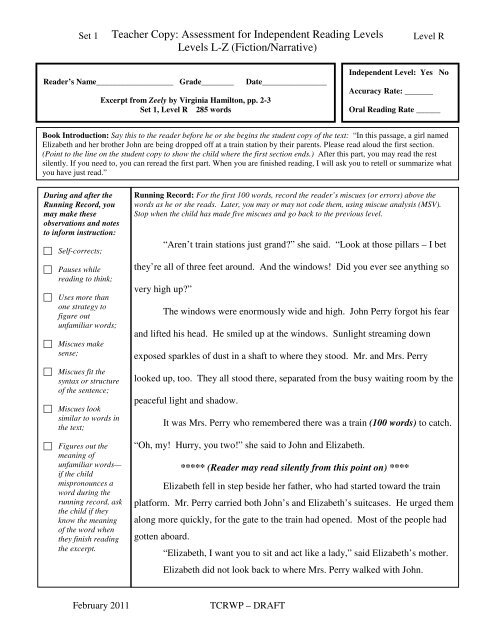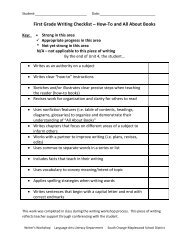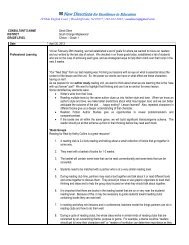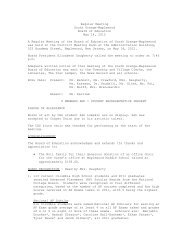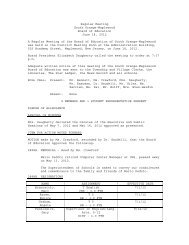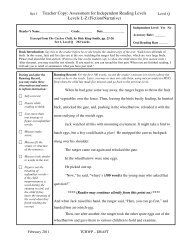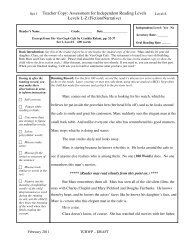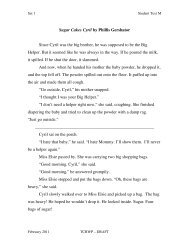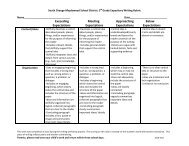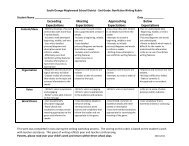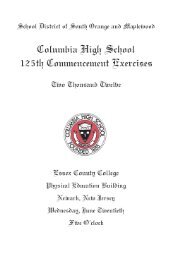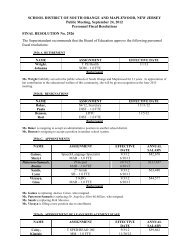Teacher Copy: Assessment for Independent Reading Levels Levels ...
Teacher Copy: Assessment for Independent Reading Levels Levels ...
Teacher Copy: Assessment for Independent Reading Levels Levels ...
You also want an ePaper? Increase the reach of your titles
YUMPU automatically turns print PDFs into web optimized ePapers that Google loves.
Set 1<br />
<strong>Teacher</strong> <strong>Copy</strong>: <strong>Assessment</strong> <strong>for</strong> <strong>Independent</strong> <strong>Reading</strong> <strong>Levels</strong><br />
<strong>Levels</strong> L-Z (Fiction/Narrative)<br />
Level R<br />
Reader’s Name___________________ Grade________<br />
Excerpt from Zeely by Virginia Hamilton, pp. 2-3<br />
Set 1, Level R 285 words<br />
Date________________<br />
<strong>Independent</strong> Level: Yes No<br />
Accuracy Rate: _______<br />
Oral <strong>Reading</strong> Rate ______<br />
Book Introduction: Say this to the reader be<strong>for</strong>e he or she begins the student copy of the text: “In this passage, a girl named<br />
Elizabeth and her brother John are being dropped off at a train station by their parents. Please read aloud the first section.<br />
(Point to the line on the student copy to show the child where the first section ends.) After this part, you may read the rest<br />
silently. If you need to, you can reread the first part. When you are finished reading, I will ask you to retell or summarize what<br />
you have just read.”<br />
During and after the<br />
Running Record, you<br />
may make these<br />
observations and notes<br />
to in<strong>for</strong>m instruction:<br />
Self-corrects;<br />
Pauses while<br />
reading to think;<br />
Uses more than<br />
one strategy to<br />
figure out<br />
unfamiliar words;<br />
Miscues make<br />
sense;<br />
Miscues fit the<br />
syntax or structure<br />
of the sentence;<br />
Miscues look<br />
similar to words in<br />
the text;<br />
Figures out the<br />
meaning of<br />
unfamiliar words—<br />
if the child<br />
mispronounces a<br />
word during the<br />
running record, ask<br />
the child if they<br />
know the meaning<br />
of the word when<br />
they finish reading<br />
the excerpt.<br />
Running Record: For the first 100 words, record the reader’s miscues (or errors) above the<br />
words as he or she reads. Later, you may or may not code them, using miscue analysis (MSV).<br />
Stop when the child has made five miscues and go back to the previous level.<br />
“Aren’t train stations just grand?” she said. “Look at those pillars – I bet<br />
they’re all of three feet around. And the windows! Did you ever see anything so<br />
very high up?”<br />
The windows were enormously wide and high. John Perry <strong>for</strong>got his fear<br />
and lifted his head. He smiled up at the windows. Sunlight streaming down<br />
exposed sparkles of dust in a shaft to where they stood. Mr. and Mrs. Perry<br />
looked up, too. They all stood there, separated from the busy waiting room by the<br />
peaceful light and shadow.<br />
It was Mrs. Perry who remembered there was a train (100 words) to catch.<br />
“Oh, my! Hurry, you two!” she said to John and Elizabeth.<br />
***** (Reader may read silently from this point on) ****<br />
Elizabeth fell in step beside her father, who had started toward the train<br />
plat<strong>for</strong>m. Mr. Perry carried both John’s and Elizabeth’s suitcases. He urged them<br />
along more quickly, <strong>for</strong> the gate to the train had opened. Most of the people had<br />
gotten aboard.<br />
“Elizabeth, I want you to sit and act like a lady,” said Elizabeth’s mother.<br />
Elizabeth did not look back to where Mrs. Perry walked with John.<br />
February 2011<br />
TCRWP – DRAFT
Set 1<br />
<strong>Teacher</strong> <strong>Copy</strong>: <strong>Assessment</strong> <strong>for</strong> <strong>Independent</strong> <strong>Reading</strong> <strong>Levels</strong><br />
<strong>Levels</strong> L-Z (Fiction/Narrative)<br />
Level R<br />
“Goodness,” she said to herself, “do you think I don’t know what’s what? Leave me alone and I’ll (200<br />
words) do what I’m supposed to do!”<br />
Elizabeth heard her mother talking to John. “Remember to comb your hair,” she was saying,<br />
“and don’t bother people with questions.”<br />
“You can tell him not to open his mouth <strong>for</strong> the whole trip.”<br />
“Elizabeth,” her father said, “calm down.”<br />
“Just tell him not to bother me!”<br />
“Elizabeth!” her father said.<br />
“Mind that you do whatever Elizabeth says…” It was Mrs. Perry talking to John.<br />
Elizabeth heard her. She smiled and held her head up like a proper lady. (285 words)<br />
Total miscues including<br />
self-corrected: _____<br />
Self-corrections: _____<br />
Miscues reader did not<br />
self-correct: ______<br />
Accuracy Rate: Circle the number of miscues the reader did not self-correct.<br />
100% 99% 98% 97% 96%<br />
0 miscues 1 miscue 2 miscues 3 miscues 4 miscues<br />
96%-100% accuracy is necessary to determine the reader’s independent reading level.<br />
Try a lower level text if the reader made 5 or more miscues.<br />
* If the child makes the same miscue repeatedly, count it as one miscue.<br />
Literal and Inferential Retelling or Summary<br />
Say, “Please retell or summarize what you just read.” Write notes regarding the student’s retelling or summary on the back of<br />
this page. If the student has trouble getting started, you can prompt him/her. Make a note that you prompted the student.<br />
Use the Retelling Rubric and Sample Student Responses to determine if the child’s retelling and responses to the<br />
comprehension questions are acceptable. If a student answers a comprehension question as part of the retelling you do not<br />
have to ask him/her that question. Students at this level should be able to retell/summarize a story using elements of<br />
narrative text structure.<br />
Optional: You may ask the student to write his/her responses to this section on the attached <strong>for</strong>ms. If you choose this option,<br />
observe the student as he/she writes. You must follow up any incorrect written response with a chance <strong>for</strong> the student to<br />
answer the question orally.<br />
February 2011<br />
TCRWP – DRAFT
Set 1<br />
<strong>Teacher</strong> <strong>Copy</strong>: <strong>Assessment</strong> <strong>for</strong> <strong>Independent</strong> <strong>Reading</strong> <strong>Levels</strong><br />
<strong>Levels</strong> L-Z (Fiction/Narrative)<br />
Level R<br />
Comprehension Questions Section: Analyze the student’s retelling/summary to see if it contains in<strong>for</strong>mation that answers<br />
each question below. If a question was not answered in the retelling, ask it and record the student’s response.<br />
1. Literal Question: What are some of the directions Mrs. Perry gives to John?<br />
2. Literal Question: What did Elizabeth’s mom say to John that made Elizabeth smile and hold her head up?<br />
3. Inferential Question: How do you think Elizabeth will act on the train with her brother?<br />
4. Inferential Question: How do you think Elizabeth feels going on a trip by herself with her brother?<br />
Oral <strong>Reading</strong> Fluency Scale – Circle the Appropriate Level<br />
Fluent<br />
Level<br />
4<br />
Level<br />
3<br />
Reads primarily in larger, meaningful phrase groups. Although some regressions, repetitions, and deviations from text<br />
may be present, these do not appear to detract from the overall structure of the text. Preservation of the author’s syntax<br />
is consistent. Most of the text is read with expressive interpretation.<br />
Reads primarily in three or four-word phrase groups. Some small groupings may be present. However, the majority of<br />
phrasing seems appropriate and preserves the syntax of the author. Some expressive interpretation is present; this may<br />
be inconsistent across the reading of the text.<br />
Non fluent<br />
Level<br />
2<br />
Level<br />
1<br />
Reads primarily in two-word phrases with some three or four-word groupings. Some word-by-word reading may be<br />
present. Word groupings may seem awkward and unrelated to larger context of sentence or passage. Beginning a little<br />
expressive interpretation, frequently first seen when reading dialogue.<br />
Reads primarily word-by-word. Occasional two-word or three-word phrases may occur—but these are infrequent and/or<br />
they do not preserve meaningful syntax. No expressive interpretation.<br />
Adapted from: U.S. Department of Education, Institute of Education Sciences, National Center <strong>for</strong> Education Statistics, National<br />
<strong>Assessment</strong> of Educational Progress (NAEP), 2002 Oral <strong>Reading</strong> Study.<br />
Level R Benchmarks <strong>for</strong> Oral <strong>Reading</strong> Rate (Words Per Minute)<br />
Oral reading rate is the number of words per minute the reader reads with accuracy, intonation and meaningful phrasing.<br />
Level 1<br />
Needs Support<br />
Level 2<br />
Approaches Standards<br />
Level 3<br />
Meets Standards<br />
Level 4<br />
Exceeds Standards<br />
74 wpm or less 75-104 wpm 105-145 wpm 146 wpm or more<br />
Please refer to the Benchmarks <strong>for</strong> Student Progress <strong>for</strong> details regarding Oral <strong>Reading</strong> Rate.<br />
Final Score<br />
Yes No Was the reader’s accuracy rate at least 96%?<br />
Yes No Did the student read with fluency? (a score of 3 or 4 on the Oral <strong>Reading</strong> Fluency Scale)<br />
Yes No Did the reader correctly answer at least 3 questions in the Comprehension Questions Section?<br />
Yes No Did the retelling/summary express the important things that happened in the text?<br />
Is this the student's independent reading level?<br />
• If you did NOT answer “yes” to all four questions in this Final Score box, try an easier text. Keep moving to easier texts until you find the level at<br />
which you are able to answer “yes” to all four questions in the Final Score box.<br />
• If you circled four “yes” answers in this Final Score box, the student is reading strongly at this level. However, it is possible that the student may also<br />
read strongly at a higher level. Keep moving to higher passages until you can no longer answer “yes” to all four questions. The highest level that<br />
showed strong reading is the independent reading level. For example, you might find that you answered “yes” to all four questions in the Final Score<br />
box <strong>for</strong> level P, then a “yes” to all four questions <strong>for</strong> level Q, but only three “yes” answers <strong>for</strong> level R. Level Q is the highest passage on which you<br />
were able to answer “yes” to all four questions in the Final Score box. Level Q is the current independent reading level <strong>for</strong> the student.<br />
February 2011<br />
TCRWP – DRAFT
Name:<br />
Set 1<br />
<strong>Teacher</strong> <strong>Copy</strong>: <strong>Assessment</strong> <strong>for</strong> <strong>Independent</strong> <strong>Reading</strong> <strong>Levels</strong><br />
<strong>Levels</strong> L-Z (Fiction/Narrative)<br />
Date:<br />
Level R<br />
In writing, retell or summarize what you just read.<br />
________________________________________________________________________<br />
________________________________________________________________________<br />
________________________________________________________________________<br />
________________________________________________________________________<br />
________________________________________________________________________<br />
________________________________________________________________________<br />
________________________________________________________________________<br />
________________________________________________________________________<br />
________________________________________________________________________<br />
________________________________________________________________________<br />
________________________________________________________________________<br />
________________________________________________________________________<br />
________________________________________________________________________<br />
________________________________________________________________________<br />
February 2011<br />
TCRWP – DRAFT
Name:<br />
Set 1<br />
<strong>Teacher</strong> <strong>Copy</strong>: <strong>Assessment</strong> <strong>for</strong> <strong>Independent</strong> <strong>Reading</strong> <strong>Levels</strong><br />
<strong>Levels</strong> L-Z (Fiction/Narrative)<br />
Date:<br />
Level R<br />
Please answer these questions in your own words. You may use extra paper if you need it.<br />
Question #1: What are some of the directions Mrs. Perry gives to John?<br />
____________________________________________________________________________________<br />
____________________________________________________________________________________<br />
____________________________________________________________________________________<br />
Question #2: What did Elizabeth’s mom say to John that made Elizabeth smile and hold her head up?<br />
____________________________________________________________________________________<br />
____________________________________________________________________________________<br />
____________________________________________________________________________________<br />
Question #3: How do you think Elizabeth will act on the train with her brother?<br />
____________________________________________________________________________________<br />
____________________________________________________________________________________<br />
____________________________________________________________________________________<br />
Question #4: How do you think Elizabeth feels going on a trip by herself with her brother?<br />
____________________________________________________________________________________<br />
____________________________________________________________________________________<br />
____________________________________________________________________________________<br />
February 2011<br />
TCRWP – DRAFT


